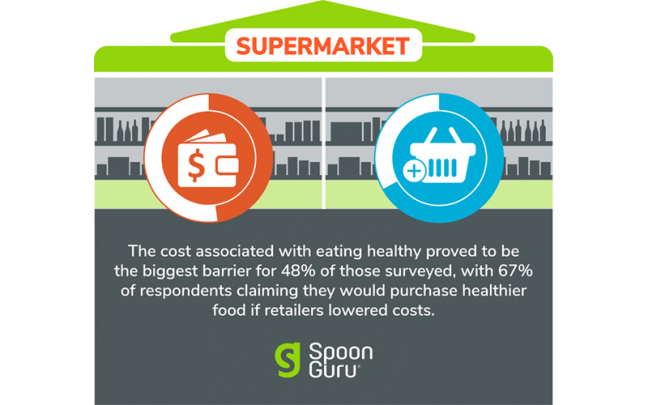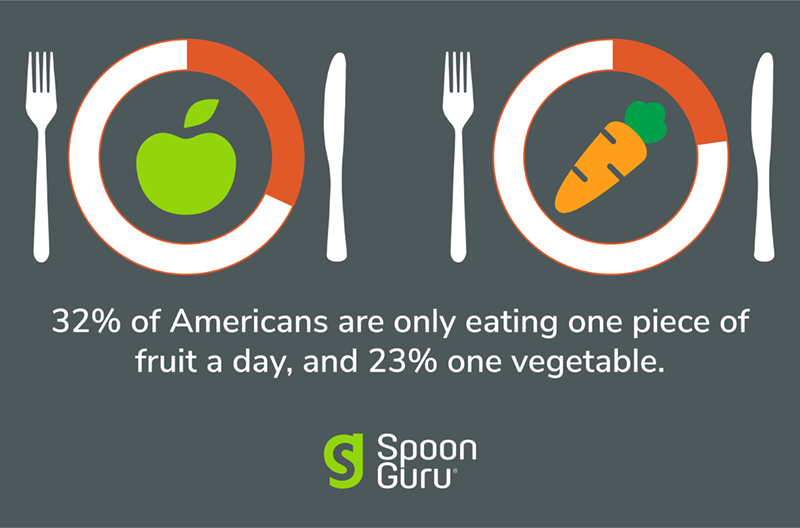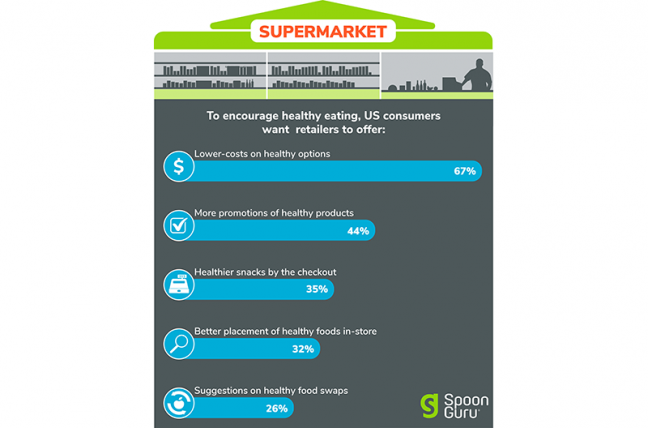A recent study suggests that 72 percent of consumers do not understand the recommended levels of salt, fat and sugar consumption. The statewide health survey by Spoon Guru, a London-based developer of AI technology designed to assist in food discovery, revealed that only 28 percent of shoppers included in the study felt confident in deciphering the value of nutrients in food.
The study, which was conducted in May 2019 and included 2,000 U.S. respondents, looked into consumer spending habits and motivations for purchasing decisions. Of the shoppers surveyed, 54 percent responded in favor of retailers doing more to encourage healthy eating. One quarter of the survey’s participants agreed that retailers should offer tools to help consumers identify foods that contribute to health and dietary requirements.
Other findings from the study included the discovery that 40 percent of the participants are afraid of developing a serious illness, 19 percent fear an early death due to an unhealthy diet, and 74 percent of those surveyed stated they have taken measures to improve their health and well-being over the past year. However, results suggest they are failing, as 88 percent revealed their diets were still unhealthy. In line with these findings, 68 percent of respondents admitted to eating five or more processed meals a week, despite the fact that 50 percent claimed they had been eating less processed food over the past year. The conflicting results suggest shoppers may be attempting to make healthier choices, but are unaware that products like cereal, pasta and cheese are actually processed foods.
 Of the participants who stated they were eating less sugar (55 percent), the research found that 29 percent are using honey as an alternative, and 10 percent are using maple syrup, suggesting a lack of awareness that these products contain high levels of sugar. Meanwhile, 42 percent of respondents admitted to adding two or more spoonfuls of sugar to their daily hot drinks, 32 percent admitted to only eating one piece of fruit per day, and 23 percent admitted to eating only one vegetable.
Of the participants who stated they were eating less sugar (55 percent), the research found that 29 percent are using honey as an alternative, and 10 percent are using maple syrup, suggesting a lack of awareness that these products contain high levels of sugar. Meanwhile, 42 percent of respondents admitted to adding two or more spoonfuls of sugar to their daily hot drinks, 32 percent admitted to only eating one piece of fruit per day, and 23 percent admitted to eating only one vegetable.
When attempting to prevent health related diseases by improving their diet, 59 percent revealed the cost of their weekly grocery shop had increased, with the majority claiming to spend as much as $31 more each week. The cost associated with healthy eating proved to be the biggest barrier for 48 percent of those surveyed, with 67 percent claiming they would purchase healthier food if retailers lowered costs.

To encourage healthy eating, U.S. consumers surveyed want retailers to:
1. Lower costs on healthy options—67 percent
2. More promotions of healthy products—44 percent
3. Healthy snacks by the checkout—35 percent
4. Better placement of healthy foods in-store—32 percent
5. Suggestions on healthy food swaps—26 percent
Tools needed to encourage U.S. shoppers to make healthier food choices:
1. In-store food discovery taste tests—46 percent
2. Healthy eating recipes in-store—40 percent
3. Better food labels on packaging—39 percent
4. Better food labels on shelves—37 percent
5. Technology to aid food discovery—25 percent
Markus Stripf, co-founder and CEO of Spoon Guru, said, “Americans are trying to adopt a healthier diet, however there is a need for further clarity around nutrition. In particular, how they can manage their fat, salt and sugar intake to prevent health related illnesses. What is also clear from the research is that a quarter of consumers are open to exploring technology that can assist with the everyday challenge to find the right foods in order to eat healthier.”
